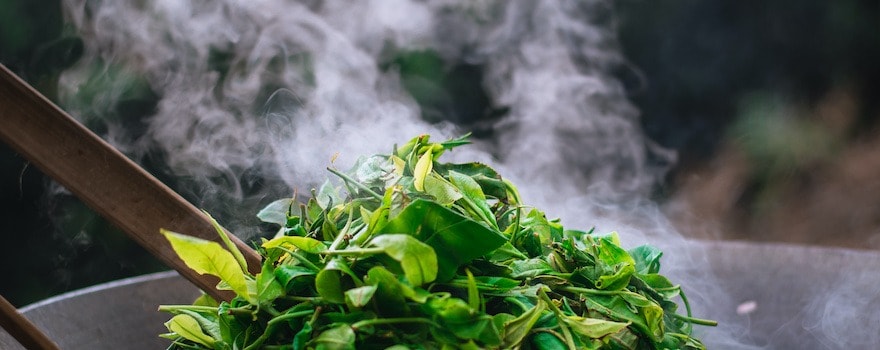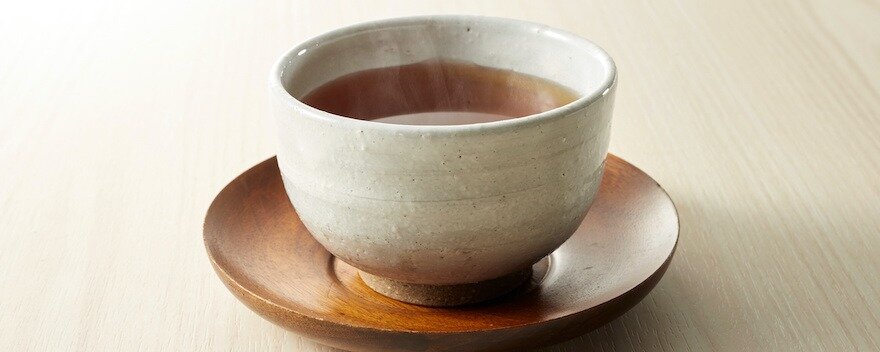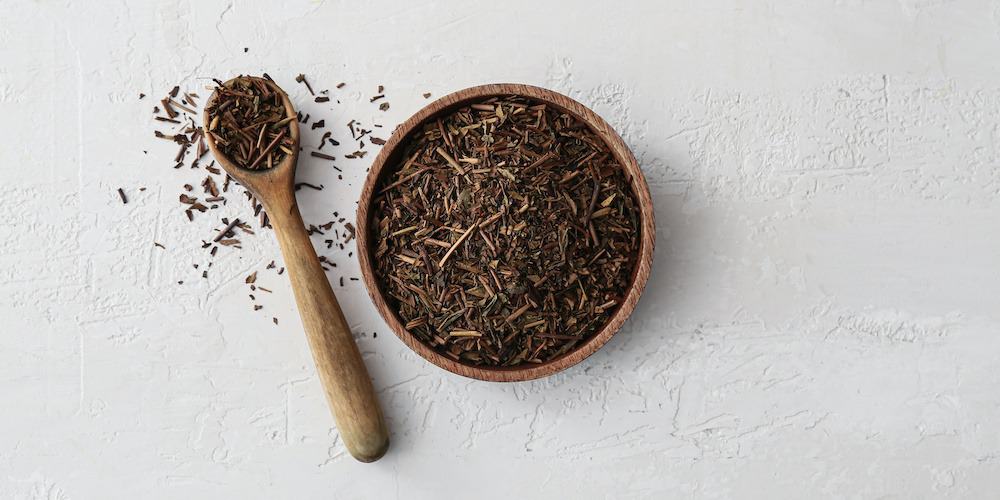BENEFITS OF HOJICHA
✓ Reduces stress
✓ Antioxidant
✓ Relieves digestive issues
✓ May help with weight loss
What is hojicha tea?
The term hojicha (ほうじ茶) means roasted tea in Japanese. It is a type of green tea obtained by roasting the leaves from different varieties: Bancha, Sencha, or Kukicha.
Harvest takes place at the end of the season, in October. The leaves are then roasted at a temperature of 200°C. During the process, the water evaporates and the leaves take on a lovely reddish-brown color.
Roasting produces a tea with a woody flavor and a roasted taste. It is considered one of the most refined teas in the world.
It has notes of hazelnut, caramel, vanilla, and cocoa.
This process also alters the chemical composition of the leaves. As a result, they lose a large amount of tannins and catechins, which makes the tea less astringent.
The result is a beverage low in theine/caffeine, perfect for enjoying in the evening.
Hojicha tea is highly prized by the Japanese. It often accompanies sushi, fish dishes, and cheese. In the traditional recipe for Ochazuke, a typical Japanese dish, brewed green tea is poured directly over rice.
In addition to its taste qualities, it offers health benefits. Thanks to its relaxing effect, it reduces stress and anxiety. It is also an antioxidant, soothes digestive issues, and helps with weight loss. Finally, it is recognized for its potential anti-cancer properties.
Also read | Buying guide to the best natural anti-stress remedies
Nutritional composition
- Amino acids including L-theanine
- Vitamins : A, C, E
- Theine/caffeine (in small amounts)
- Antioxidant compounds : polyphenols (flavonoids), chlorophyll, catechins

Benefits of hojicha tea
🧘🏻♀️ Reduces stress
Hojicha tea has a soothing effect and is relaxing for the mind. Thus, it helps relieve stress, anxiety, and depression. Moreover, it improves certain brain functions such as memory, learning, and mental sharpness.
Like the matcha, it contains theanine. This amino acid contributes to relaxation and stress reduction. Indeed, it is capable of reducing cortisol levels (or ‘stress hormone’) as shown by this study.
It also stimulates mental capacity and supports brain function.
🥝 Antioxidant
Like other green teas, it contains antioxidant compounds. Thus, it contains polyphenols (flavonoids) and chlorophyll. However, it contains fewer catechins, some of which are destroyed during the roasting process as shown by this study.
However, it remains useful for fighting free radicals and the damage they cause. It protects cells from aging.
Finally, the polyphenols and the vitamin C it contains strengthen the immune system.
♻️ Relieves digestive issues
Because it is low in theine and tannins, it is ideal for delicate stomachs and people sensitive to caffeine (children, older adults…). It is very mild and well tolerated by the body.
Consumed after a meal, it aids digestion. It also relieves certain digestive issues such as bloating or stomach acidity.
It can be enjoyed at any time of day and even in the evening, before bedtime. It is a good substitute for coffee or strong teas, which are too high in tannins.
🏃 May help with weight loss
Hojicha tea speeds up metabolism and increases the body’s use of lipids. Thus, it reduces storage in adipose tissue and promotes fat burning.
It is an excellent natural fat burner.
By improving digestion and relieving dyspepsia, it also contributes to a flat stomach. Consuming hojicha tea may therefore be beneficial for maintaining a slim figure or losing weight.
Further studies are still needed to confirm the effectiveness of hojicha tea for weight loss and obesity.
🔬 Potentially anti-cancer
Thanks to its antioxidant action, it could help prevent the development of cancer.
In this study, for example, it was combined with other green teas (matcha, oolong…) and then administered to patients with bladder cancer.
It has been shown to be effective at blocking carcinogenic substances and inhibiting the growth of cancer cells. This is due to the presence of antioxidant compounds such as polyphenols and flavonoids.

How to consume it?
Prefer organic hojicha tea
We recommend buying tea originating from Japan and organically grown. This ensures a product free from pesticide residues and farming that respects the environment.
This criterion is all the more important because tea leaves are very absorbent. They easily retain soil pollutants and heavy metals such as lead.
Preparation of hojicha tea
To prepare your drink, steep the leaves for 2 to 3 minutes in water heated to 70-85°C. Use a teapot, a tea infuser ball, or a cotton tea bag.
Use about 3 grams of dried leaves per cup.
Like matcha, hojicha tea can be used to make lattes, smoothies, ice creams, and pastries. It is also available in powdered form for easier use.

Dosage
It is recommended to drink, hot or cold, 2 to 4 cups per day.
Contraindications and side effects
At the recommended doses, there are no notable contraindications or side effects. However, excessive consumption may cause diarrhea.
If you experience adverse effects, stop consuming it and consult a doctor.
Sources and scientific studies
Shinsuke Hidese, Shintaro Ogawa, Miho Ota, Ikki Ishida, Zenta Yasukawa, Makoto Ozeki, and Hiroshi Kunugi, 2019. Effects of L-Theanine Administration on Stress-Related Symptoms and Cognitive Functions in Healthy Adults: A Randomized Controlled Trial.
Ryoyasu Saijo, Yoshiyuki Takeda, 1999. HPLC Analysis of Catechins in Various Kinds of Green Teas Produced in Japan and Abroad.
D Sato, 1999. Inhibition of urinary bladder tumors induced by N-butyl-N-(4-hydroxybutyl)-nitrosamine in rats by green tea



